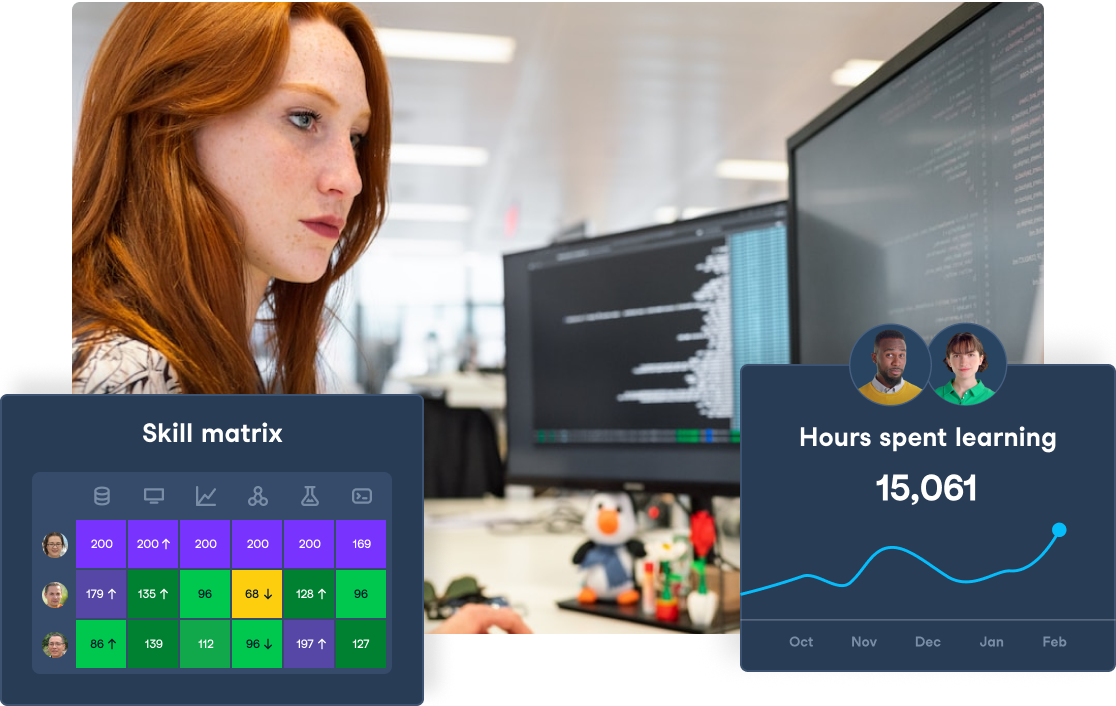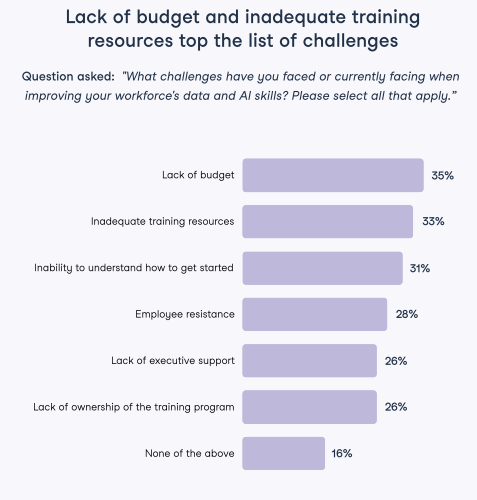Track
Artificial Intelligence (AI) is everywhere around us. In just a few decades, it has become an integral part of our daily lives, often in ways we may not even realize. It's in our technologies, healthcare and banking systems, workplaces, and even homes. It's shaping industries, driving innovation, and transforming the way we interact with the world.
Following the generative AI revolution that started with the launch of ChatGPT, we can only expect AI to conquer new facets of our existence. Against this backdrop, a new form of literacy has emerged as a necessity for companies, developers, and even individuals - AI literacy. According to DataCamp’s State of Data & AI Literacy 2024, 62% of surveyed business leaders believe AI literacy is now important for their teams’ day-to-day tasks.
Unfortunately, we are not quite there yet. Despite the massive acceleration in demand for AI skills in recent years, the market is still suffering from an acute AI talent shortage. According to the SAS’ How to Solve the Data Science Skill Shortage Report, 63% of surveyed IT leaders think AI and ML are the biggest skill shortages they are facing.
With such a scarce number of AI experts in the market, companies have little choice but to pay big salaries to attract talent, which may not be feasible for many companies. As a result, reskilling and upskilling may prove a more cost-effective strategy compared to recruiting.
In this article, we will look at the current AI talent shortage and how to bridge the gap through internal skill development. We will explain how to implement and measure the success of your reskilling and upskilling programs, providing illustrative case studies where DataCamp helped business partners boost their AI literacy. Finally, we will look at the main challenges to implementing internal skill development programs in your company.
Empower Your Team with AI Literacy
Build an AI-literate workforce with DataCamp for Business. Access diverse courses, hands-on projects, and centralized insights for teams of 2 or more.

Understanding the AI Talent Gap
Data and AI are reshaping the business and organizational landscape. The current generative AI revolution is just the latest push in a series of technological breakthroughs that are changing the way we live and companies do business. Inevitably, these deep and fast changes are also changing the skill landscape.
Until recently, the focus was on data literacy, the ability to read, write, analyze, communicate, and reason with data, a skill set enabling individuals and organizations to make informed, data-driven decisions. These skills, crucial by themselves, are also complementary when it comes to AI literacy, the ability to effectively, ethically, and responsibly understand, utilize, and guide AI systems.
The recent AI boom is leading to significant investments in AI infrastructure and AI initiatives, aimed at enhancing decision-making, automating tasks, increasing operational efficiency, and improving customer experience, among other potential benefits. But such a transition requires time, money, and, more importantly, the right talent.
However, finding AI-literate workers remains an important challenge for companies. According to a Deloitte survey, in 2022 there were only 22,000 AI specialists globally, well below to catch up with the urgent demand of AI professionals. Several reasons may explain the need for more AI talent, including educational gaps and the lag in formal training programs.
As a result, companies need to bet extremely high to recruit the limited AI talent available or pay extra costs for the service of external consultants. Such a scenario is delaying the implementation of AI projects, reducing the opportunities for companies to gain a competitive edge through this technology, especially small and medium-sized companies.
That’s why companies from all sectors are progressively considering internal training programs as a more affordable way to bridge the AI talent gap. Let’s analyze how to implement a successful upskilling and reskilling initiative in your company.
Strategies for Developing Internal AI Skills
Despite increasing efforts to develop internal training programs, the AI literacy gap remains prominent across companies.
Several reasons explain this. First, it’s important to note that upskilling and reskilling in AI literacy is a multi-year journey. Moreover, as innovation accelerates in AI and data science, the pressure mounts for organizations to adapt, making the data literacy skill gap even more pronounced.
Furthermore, as we discovered in the DataCamp’s State of Data & AI Literacy 2024, companies are facing several difficulties in filling the skill gap, with the lack of budget and inadequate training resources at the top of the list of challenges.

Source. DataCamp
In the following subsection, we will provide several tips to successfully implement an internal AI training program.
Assess current skills to identify gaps
The first step in launching an internal training initiative is assessing your team's current skill levels to identify gaps and determine specific training needs. Conducting a comprehensive skills assessment allows organizations to understand the proficiency levels of their employees in AI, data, and related technologies.
This evaluation can be achieved through surveys, interviews, and practical assessments to gauge knowledge, expertise, and familiarity with various data analytics tools and techniques. You can also use DataCamp’s data maturity assessment to understand where your team, department, and organization are located on the data maturity spectrum.
Implementing comprehensive training programs
AI and data literacy is not a one-size-fits-all concept. Each individual in your organization has unique needs based on their role and skill level. A successful training program should offer personalized learning experiences tailored to these specific needs, ensuring that every employee can benefit and grow from the program.
Understanding your team’s current skill set allows you to customize training programs effectively. Collaboration with your AI and data analytics learning partner, such as DataCamp, can facilitate this process. Our expert teams can help you tailor existing learning tracks or create new ones to meet your organization's specific needs.
Fostering a culture of learning and innovation
Developing AI literacy is about more than just acquiring skills; it’s about fostering a cultural shift toward an AI-informed mindset. This requires ongoing communication and engagement.
Your internal training initiative should keep learners informed about the importance of AI literacy, how it benefits their roles, and the program's progress. It should also promote interactive learning experiences, provide forums for knowledge sharing, such as workshops and seminars, and recognize or reward progress to maintain high levels of engagement.
Leveraging mentorship and cross-functional teams
Effective learning goes beyond individual skills. Learning AI and data can be challenging –and also isolating, in the case of online learning–, so fostering a sense of community is vital. A successful training initiative should create communities of practice where learners can collaborate, share insights, and support each other, enhancing both the learning experience and the application of new skills.
There are many ways to enhance interactivity and knowledge sharing in your training program. Here is a list of some good examples:
- Host instructor-led sessions with internal experts, tasking learners with solving real-world use cases.
- Encourage collaboration between departments to integrate AI solutions.
- Integrate gradable capstone exercises at the end of every learning track.
- Incorporate gamification elements, such as leaderboards, badges, or rewards to make learning engaging.
Case Study of Successful Internal AI Skill Development
We are happy to share our expertise with companies of all sizes and sectors willing to embrace the AI revolution. In this section, we will talk about a recent collaboration between DataCamp and Bankinter, a leading Spanish bank. Three years ago, the banking company signed a partnership with DataCamp for Business to address the critical need for advanced data and AI skills.
In the first place, the initiative was aimed at bridging the skills gap in analytical areas, ensuring that STEM talent could effectively leverage modern data tools. However, later on, recognizing the need to scale these efforts, Bankinter extended its program to include everyone within the organization –covering offices in Spain, Luxembourg, Ireland, and Portugal– and embedding a data-centric culture.
Magdalena Ozores Avanzini, Talent & Development Manager at Bankinter states the goal of the initiative:
Upskilling on data and AI allows our people to understand, explore, and analyze data using state-of-the-art processes and tools. This enables better and faster decision-making, enhancing our time-to-market response with innovative products, solutions, and customer-centric approaches.
Magdalena Ozores Avanzini, Talent & Development Manager at Bankinter
Following the extension of the scope of the initiative, Bankinter rolled out over 60 custom learning paths (both in English and Spanish) for various teams, focusing on upskilling more than 700 employees in Python, SQL, Power BI, ChatGPT, as well as data and AI literacy. The release of Spanish-language courses on DataCamp was particularly crucial, as it ensured that all employees, regardless of their English proficiency, could fully engage with the content and learn effectively.
As a result, Bankinter fostered a data-driven culture, achieving significant metrics: 700+ learners upskilled, 8,264 chapters completed, 7,649 hours learned, and 9,166,853 XP earned.
Measuring the Effectiveness of Internal Skill Development
Effective learning begins and ends with assessment. An internal training initiative should have well-defined assessments to measure your organization’s strengths and skill gaps before, during, and after the learning program. This ensures continuous improvement and demonstrates the tangible benefits of the training.
Establishing clear metrics and methods to measure the success of your training program is crucial. Define key performance indicators (KPIs) and objectives that align with your business goals, such as enhanced AI skills, increased productivity and efficiency due to AI skills, as well as cost savings from decreased reliance on external AI talent. These metrics will help you track progress and demonstrate the impact of your training efforts.
At the same time, establishing a feedback mechanism for your training materials and learning activities is key to ensuring constant improvement. This includes regular assessments and evaluations of training programs and surveys to gauge employee satisfaction and confidence in AI skills.
Why Choose DataCamp for Business?
With this context in mind, DataCamp for Business stands out as an ideal AI training partner. Our mission is to democratize data and AI skills for everyone. Since our inception in 2013, we have upskilled more than 14 million learners globally, including organizations from diverse sectors such as governments, universities, businesses, and NGOs.
More than ten years later, we keep working hard to offer the best education to our learners. The accumulated experience has allowed us to understand the motivations of the different types of customers who want to learn data science. As a result, we’re offering a service that can be customized and tailored to the specific needs of our users.
That’s why we launched DataCamp for Business, a solution specially designed to meet the needs of companies of all kinds and sizes.
If you’re planning a data analytics academy for your organization to upskill employees, we are here to help. With DataCamp for Business, you can expect the following:
- An industry-leading learning platform, trusted by 80% of Fortune 1000 companies, including Google, Microsoft, Uber, and eBay.
- A world-class data science and AI curriculum designed by industry experts, that includes courses on Python, SQL, R, ChatGPT, Power BI, Tableau, and AI Literacy.
- Flexible learning tracks that can be customized to the needs of your organization.
- Interactive learning environment with hands-on exercises and real-world use cases.
- Bite-sized lessons for effective knowledge retention.
- Precise learning assessments that allow you to pinpoint and track your company’s strengths and skill gaps at scale.
- Access to industry-recognized data certifications to bridge the gap from education to work.
- Seamless integration capabilities with leading SSO and LMS providers.
- Customer success assistance to provide resources and guidance on everything from adoption best practices to SSO and LMS integrations.
Elevate Your Organization's AI Skills
Transform your business by empowering your teams with advanced AI skills through DataCamp for Business. Achieve better insights and efficiency.

Challenges and Solutions in Internal AI Skill Development
While the benefits of an AI culture are clear, establishing an internal skill development program can come with its own set of challenges. Here are some common obstacles and strategies to overcome them.
Resistance to change
Like any cultural shift, moving to an AI-driven culture can be met with resistance. Overcome this by communicating the benefits of an AI culture, providing training, and involving employees in the change process. We cover how to boost learner engagement in more detail in a separate article, which discusses how to overcome cultural and employee resistance.
The article covers various strategies you can implement, including regular promotion of the program, internal communications, learner testimonials, a learner-of-the-month program, and lunch-and-learn sessions. It’s also important to address common misconceptions about AI, such as the fear of obsolescence and job automation.
Ensuring access to quality resources
As we already mentioned, the lack of budget and inadequate training resources are the biggest challenges companies are facing in implementing internal learning programs.
The solution for these challenges is crystal clear: take your time to find the right training program and partner, and don’t be shy at the moment of allocating the budget. Remember: upskilling and reskilling in AI literacy is a multi-year journey that will require money, confidence, and patience to deliver its benefits.
Conclusion
AI literacy is a fundamental component of success in modern business. Successfully building this in your organization will lead to better outcomes for your business and your customers and will empower employees to drive more value in their daily responsibilities.
Fostering an AI culture is not a one-off initiative but a continuous journey that requires strategic planning, commitment, and effort. However, the benefits - informed decision-making, innovation, and increased employee engagement, to name a few - make it a worthwhile endeavor. As we move further into the AI-driven era, businesses that succeed in cultivating a strong AI culture will be better equipped to leverage data for sustained success.
Contact DataCamp today to get a demo and discover why 80% of the Fortune 1000 choose DataCamp. In the meantime, check out our dedicated materials to get a glimpse of what you can expect!
- What is AI Literacy? A Comprehensive Guide for Beginners
- Introducing The State of Data & AI Literacy Report 2024
- The Learning Leader's Guide to AI Literacy
- Leading platform for AI literacy across your entire business
- Designing An Effective AI Literacy Strategy: A How to Guide for LeadersAI Business Fundamentals
- How to Learn AI From Scratch in 2024: A Complete Expert Guide
- EU AI Act Fundamentals
- Bridging the Generative AI Talent Gap
- Reskilling and Upskilling in the Age of AI: Challenges and Opportunities For Organizations
- What’s Driving the Data Literacy Skills Gap?

I am a freelance data analyst, collaborating with companies and organisations worldwide in data science projects. I am also a data science instructor with 2+ experience. I regularly write data-science-related articles in English and Spanish, some of which have been published on established websites such as DataCamp, Towards Data Science and Analytics Vidhya As a data scientist with a background in political science and law, my goal is to work at the interplay of public policy, law and technology, leveraging the power of ideas to advance innovative solutions and narratives that can help us address urgent challenges, namely the climate crisis. I consider myself a self-taught person, a constant learner, and a firm supporter of multidisciplinary. It is never too late to learn new things.